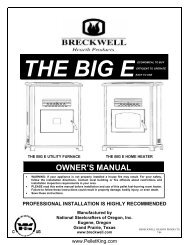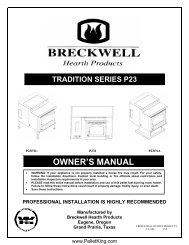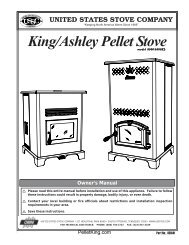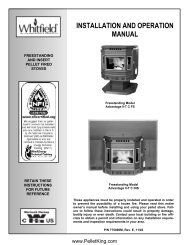P22 2004 Manual - Wood Pellet Stoves
P22 2004 Manual - Wood Pellet Stoves
P22 2004 Manual - Wood Pellet Stoves
You also want an ePaper? Increase the reach of your titles
YUMPU automatically turns print PDFs into web optimized ePapers that Google loves.
OPERATION 15<br />
PROPER FUEL<br />
THIS STOVE IS APPROVED FOR BURNING PELLETIZED WOOD FUEL ONLY! Factory-approved pellets are those ¼” or 5/16” in<br />
diameter and not over 1” long. Longer or thicker pellets sometimes bridge the auger flights, which prevents proper pellet feed. Burning wood<br />
in forms other than pellets is not permitted. It will violate the building codes for which the stove has been approved and will void all<br />
warranties. The design incorporates automatic feed of the pellet fuel into the fire at a carefully prescribed rate. Any additional fuel introduced<br />
by hand will not increase heat output but may seriously impair the stoves performance by generating considerable smoke. Do not burn wet<br />
pellets. The stove’s performance depends heavily on the quality of your pellet fuel. Avoid pellet brands that display these characteristics:<br />
a. Excess Fines – “Fines” is a term describing crushed pellets or loose material that looks like sawdust or sand. <strong>Pellet</strong>s can be screened<br />
before being placed in hopper to remove most fines.<br />
b. Binders – Some pellets are produced with materials to hold them together, or “bind” them.<br />
c. High ash content – Poor quality pellets will often create smoke and dirty glass. They will create a need for more frequent<br />
maintenance. You will have to empty the burnpot plus vacuum the entire system more often. Poor quality pellets could damage the<br />
auger. Breckwell cannot accept responsibility for damage due to poor quality pellets. Your dealer can recommend a good quality pellet<br />
dealer in your area.<br />
PRE-START-UP CHECK<br />
Remove burnpot, making sure it is clean and none of the air holes are plugged. Clean the firebox, and then reinstall burnpot. Clean door<br />
glass if necessary (a dry cloth or paper towel is usually sufficient). Never use abrasive cleaners on the glass or door. Check fuel in the<br />
hopper, and refill if necessary.<br />
NOTE: The <strong>P22</strong> Hopper can hold up to 45 lbs. of pellets.<br />
BUILDING A FIRE<br />
Never use a grate or other means of supporting the fuel. Use only the Breckwell approved burnpot.<br />
NOTE: During the first few fires, your stove will emit an odor as the high temperature paint cures or becomes seasoned to the metal.<br />
Maintaining smaller fires will minimize this. Avoid placing items on stovetop during this period because paint could be affected.<br />
THE HOTROD AUTOMATIC FIRESTARTER<br />
a. Fill hopper and clean burnpot.<br />
b. Press “Power” button. Make sure light is on.<br />
c. Adjust damper to ½” to ¾” open (pushed in is closed). This will vary depending on your installation and elevation. Once fire is<br />
established adjust for desired flame increasing the amount the damper is open as the heat setting is increased.<br />
(See “DAMPER CONTROL”)<br />
d. Adjust feed rate to desired setting by pressing “Feed Rate Advance” button.<br />
If fire doesn’t start in 15 minutes, press “Power”, wait a few minutes and start procedure again.<br />
DAMPER CONTROL<br />
The damper control rod on the stove’s lower left side adjusts the combustion air. This control is necessary due to the varied burn<br />
characteristics of individual installations, different pellet brands and pellet feed rates. It allows you to improve the efficiency of your stove.<br />
Providing correct combustion air will reduce the frequency of cleaning your glass door and prevent the rapid buildup of creosote inside your<br />
stove and chimney.<br />
You should adjust the damper based on the fire’s appearance. A low, reddish, dirty fire can be improved by pulling the damper out slightly. A<br />
“blow torch” fire can be improved by pushing the damper in a bit.<br />
As a general rule, on lower feed rate settings, the damper should be in farther. On higher feed rates, the damper should be more open.<br />
Through trial and error, you will find the best setting. Consult your dealer if you need help.<br />
NOTE: On “1”, damper should be out approximately ½” to ¾”. If damper is out too far, it can cause the fire to go out.<br />
OPENING DOOR<br />
If the door is opened while the stove is in operation it must be closed within 30 seconds or the stove will shut down. If the stove shuts down<br />
push the “Power” button to continue the operation of your stove.<br />
ROOM AIR FAN<br />
When starting your stove the Room Air Fan will not come on until the stove’s heat exchanger warms up. This usually takes about 10 minutes<br />
from start-up.<br />
www.<strong>Pellet</strong>King.com






